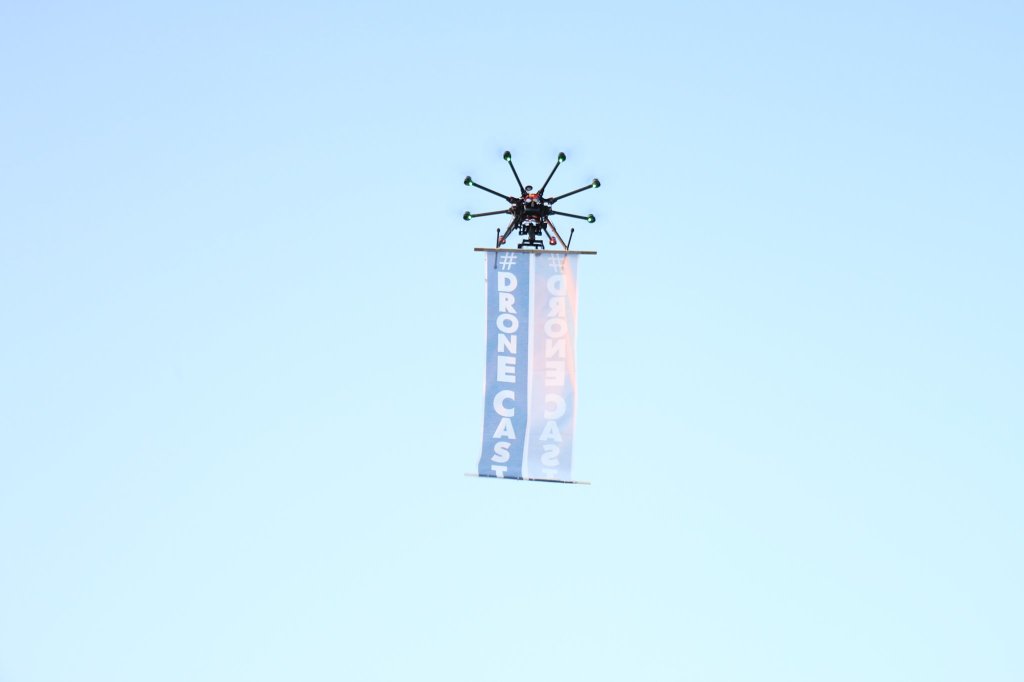
Robohub.org
The Drone Center’s Weekly Roundup: 4/13/15

DroneCast, an advertising company, uses drones to fly banners over events and businesses. Credit: DroneCast
As the FAA grants more and more exemptions for the commercial use of drones, the immediate future of the domestic drone industry is beginning to take shape. We combed through the FAA’s drone exemptions to find out exactly which companies are now allowed to use drones, and what they will be using them for.
Drones are becoming increasingly common in armed conflicts, and human rights researchers are working hard to determine the effects of drone strikes on civilians. We take a closer look at the meticulous, painstaking, and difficult process of investigating drone strikes.
News
A U.S. drone strike in Pakistan reportedly killed four people. The strike is believed to have targeted a house in the Shawal Valley in North Waziristan. It is the seventh strike in Pakistan this year. (Reuters)
The Federal Aviation Administration approved 59 petitions from companies and individuals that wish to use drones commercially. The agency also amended the requirements for obtaining an exemption from the nationwide ban on commercial drones. Instead of a private pilots license, the FAA now only requires a sport pilots license. The latest round of new approvals almost doubles the total number of companies that are allowed fly drones commercially. (FAA Press Release)
Meanwhile, Amazon received approval from the FAA to test its delivery drone concept in the United States. The online retail giant had received an approval in March for an older drone prototype that it is no longer using. The approval comes one week after Amazon criticized the FAA’s rulemaking process in a U.S. Senate hearing. (Reuters)
The Islamabad High Court issued a warrant for the arrest of Jonathan Bank, the former CIA station chief in Islamabad, and John A. Rizzo, a former CIA lawyer. The warrant comes after a contempt of court petition in a case that sought to have criminal charges brought against the two men for their involvement in directing U.S. drone strikes in Pakistan. (New York Times)
The San Jose Neighborhoods Commission in California has endorsed a push by local law enforcement to test police drones for twelve months. “We’re a city that wants to do whatever it can to protect our officers,” San Jose Mayor Sam Liccardo said in a statement to CBS in support of the measure. The proposed project will now be considered by the San Jose City Council.
Minnesota firefighters with the Department of Natural Resources are concerned that drones could inhibit efforts to fight wildfires. (CBS Local)
Commentary, Analysis and Art
Human Rights Watch and Harvard Law School’s International Human Rights Clinic released a new report that calls on all nations to quickly pass a ban on the development, production, and use of “killer robots.”
Stephen W. Preston, the lead lawyer at the Department of Defense, gave a speech at the Annual Meeting of the American Society of International Law on the legal basis for the Obama administration’s use of force in the Middle East.
New York University School of Law students and alumni are circulating a petition urging the school administration to cancel a speech by Harold Koh due to his public support of the targeted killing program. (Newsweek)
Meanwhile, at Opinio Juris, Kevin Jon Heller argues that the NYU petitioners are doing themselves “a grave disservice.”
The April issue of OE Watch by the Foreign Military Studies Office at Fort Leavenworth contains a number of essays that consider military drone use.
Michael Perry, the global PR manager for popular drone manufacturer DJI, told the International Business Times that delivery drones are unlikely to become a reality anytime soon.
At Forbes, Greg McNeal reports on a new policy directive from the FAA that restricts federal officers from ordering citizens to take down drone videos from the Internet.
Also at Forbes, Greg McNeal considers whether humans can feel empathy for robots.
In a webinar, Brendan Schulman and Matthew Bieschke analyze the FAA’s proposed rules for small drones. (YouTube)
At Motherboard, Jason Koebler considers how live-streaming drones offer new opportunities for citizen journalism.
At Just Security, Jameel Jaffer describes the “unreal” level of official secrecy surrounding the targeted killing program.
At the Nation, Grégoire Chamayou argues that the American targeted killing program has turned “wars into manhunts and humans into prey.” For our review of Chamayou’s A Theory of the Drone, click here.
At France24, Sophie Pilgrim writes that the UN’s drone unit in the Democratic Republic of Congo could be a model for future peacekeeping operations.
At IHS Jane’s 360, David C. Isby writes that Russia lacks weapons for shooting down drones.
At the Wall Street Journal, Leslie Scism and Jack Nicas report on the different insurance companies that have received permission from the FAA to fly drones.
In an essay at Bloomberg Business, Brad Wieners considers the role that drones are playing in saving migrants attempting to cross the Mediterranean to reach Europe.
Know Your Drone
The U.S. Army has unveiled a program to expedite the acquisition of unmanned ground vehicles. Under existing acquisition schedules, robots are often obsolete by the time they hit the battlefield. (Army.mil)
Drone manufacturer DJI has unveiled the Phantom III, the latest edition of its popular consumer quadcopter. (Popular Mechanics)
Meanwhile, drone maker 3D Robotics is gearing up to unveil its own latest consumer quadcopter. (The Verge)
Defense contractor Thales has proposed an armed variant of the Watchkeeper military drone for the Polish Armed Forces. (Flight Global)
In Afghanistan, the U.S. Air Force is said to be phasing in its Gorgon Stare Increment II system, a highly capable wide-area surveillance system. (Foxtrot Alpha)
Members of Congress are urging the Pentagon to develop an armed combat drone capable of staying aloft for days at a time in contested airspace. (Washington Post)
A new government-funded competition in New Zealand is offering a $50,000 prize for drone technologies for the film industry. (NBR)
In light of Amazon’s exemption to test its delivery drone system, Wired looks back at the Model 7, the first helicopter to ever be awarded a commercial license by the FAA.
Drones at Work
Churchill Downs banned visitors from using drones and selfie sticks at the upcoming Kentucky Derby. (Sports Illustrated)
David Kiarie, the head of Nairobi-based Zoom Advocacy Organization, believes that drones can be used to help advance infrastructure and development projects in unmapped areas. (Fast Company)
Patrick Meier is using drones to measure the damage from Cyclone Pam in Vanuatu. (National Geographic)
Students at the University of Oregon are using drones to measure atmospheric temperatures. (KTVZ)
DroneCast, an advertising company, uses drones to fly banners over events and businesses. (Market Watch)
Ammar Mirjan, an architect at Gramazio Kohler Research, is exploring ways of using drones for construction. (Motherboard)
Mythbusters host Jamie Hyneman tried—unsuccessfully—to use a drone to prune a tree. (Digg)
At the Royal Burgers’ Zoo in Arnhem, Netherlands, a chimpanzee used a stick to bring down a drone. (PetaPixel)
The Weekly Drone Roundup is a newsletter from the Center for the Study of the Drone. It covers news, commentary, analysis and technology from the drone world. You can subscribe to the Roundup here.
tags: c-Aerial, drones, UAVs





